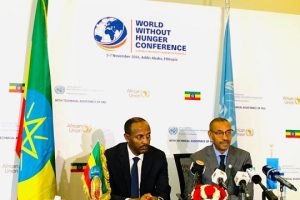
The rainy season is in full swing. Even though we still depend mainly on rain-fed agriculture to sustain our livelihood, this time of year brings worries as well. The increasing impact of climate change, the frightening sound of cloudy summer skies, and sudden heavy downpours are causes for concern.
However, in a stark departure from the previous trend, the usual rhetoric surrounding the Abbay project is easing this year. The unexpected special event that happened in the middle of this month may explain the unusually quiet atmosphere of GERD politics at this time of the year. That event was the meeting in Cairo of the leaders of Egypt and Ethiopia a day ahead of the kick-start of the Cairo Summit, a special summit of leaders of 7 neighboring states of Sudan aiming to deal with the Sudanese crisis.
War ignites or peace settles following the decisions of leaders. That is why the exchange of accusations and vows of warnings between leaders worries us deeply. It is also extremely delightful to see leaders sitting side by side, exchanging smiles and shaking hands.
So, with whatever real motive Abdel Fattah El Sisi called the gathering of leaders of Sudan’s neighboring states, the sight and sound of African leaders sitting in a circle to have a dialogue without a mediator/facilitator is at least a huge symbolic gesture indicating the possibility of reaching peaceful resolutions to the various tensions and disagreements that trouble the region.
However, in terms of practicality and its declared objective, the Cairo Summit has not yielded any outcome so far of any significance. It has been over 2 weeks since the summit was held, but Egypt’s diplomatic experiment which is seen by some analysts as assuming the role of IGAD and AU, has not been translated to any action on the ground.
Khartoum streets are still a battleground, Khartoum’s sky is still terrorizing the city’s residents with the thunderous sound of the Sudanese military jets and the raining bombs, and all the brutal scenes of conflicts are going unabated. Such emergency measures like ceasefires, humanitarian corridors, and no-fly zones have not yet been declared to alleviate the humanitarian crisis.
True, the return of peace and stability in Sudan is not only a concern of the Sudanese people but also the people of the neighboring states. Among other things, the longer Sudan remains in its present chaotic and anarchic situation, the religious fundamentalists and political extremists will have a better chance to proliferate beyond the Sudanese borders to destabilize the entire region.
As opposed to the main event of the Cairo summit, ‘the sideline event’, the preliminary event rather, the meeting of the Ethiopian and the Egyptian leaders has an immediate and practical outcome. Putting it bluntly, it was the meeting of the two leaders that attracted the interest of the international media rather than the meeting of the seven leaders. The two leaders have declared a joint decision to jump-start the stalled GERD talks and to finalize in four months.
The Sudan conflict starting from the capital city is continuously expanding despite the multiple efforts made by various actors to negotiate a ceasefire. The Sudanese state has been through several existential crises, but it has never been in an existential crisis like the present one. So the question is whether there will be a viable power in Sudan that has enough attention and energy to participate at the negotiating table of the GERD talks during the next four months.
It is therefore obvious that the fourth round of filling of the dam will be done without causing any disruption of water flow to the downstream countries just like it was in the previous three fillings. With or without the tripartite agreement, the construction of the dam will be finalized by the next year.
As GERD nears completion, the more sensible target of negotiations on the Nile would not be the tripartite deal; rather it would be the Agreement on the Nile Basin Cooperative Framework that involves all the ten riparian states. Sooner or later, Egypt should embrace this inevitable reality. Cairo should return to their senses that a lasting win-win agreement could only be reached by direct dialogue without the involvement of mediators/facilitators, not through cohesion and manipulation.
It is also unfair not to commend Ethiopia’s consistent policies towards the GERD issue and its relations with neighboring states. Ethiopia did not consider taking advantage of the ongoing turmoil in Sudan. Rather it reaffirmed its commitment to cooperate for the restoration of peace in Sudan, and the finalization of GERD talks with sound agreement that guarantees equitable share of Nile waters and respects Ethiopia’s sovereign power to use its natural resources for development.
BY SOLOMON WASSIHUN
THE ETHIOPIAN HERALD TUESDAY 1 AUGUST 2023




